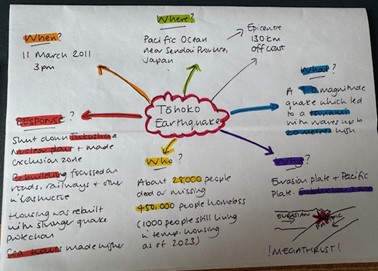by Becky Shaw Simms MA (Oxon)
Becky is a Geography tutor based in Stroud, Gloucestershire. She’s been helping students get good grades in their GCSE, A Level and IB exams since 2001.
Posted February 2025
This provides some top tips on how best to revise for Geography at GCSE/IGCSE, IB and A Level.

There’s a lot to learn for your GCSE or IGCSE exams, so make sure you start early – don’t leave it to the last minute!
First, get a copy of your syllabus – this is the definitive list of what you need to know! You need to be sure to use the right keyword in the right place in your exams, so make a glossary of definitions – some good ways to do this are in an Excel document, on post-it notes or revision cards, or in an app like Quizlet. Test yourself regularly on your keywords – repetition is a good way to remember.
Secondly, focus on your case studies. These are vital! Remember, you won’t be able to get the highest marks on the longer questions if you can’t give a detailed example, so check your syllabus to see which ones you need. For each case study, read it in detail then summarise the main points. A mind map is a great way to do this! Put the name of the case study in the middle, and then have ‘stalks’ for the key questions. This means asking: What happened? Where and when did it happen? Why did it happen? Who was affected? What was the response? Adding photos or using bright colours is a great way to help this information become more interesting and memorable. Here’s an example of a simple mind map:

Thirdly, practice! You will have a mock exam, of course, but it’s important to make sure you have a few goes at applying your knowledge – it’ll help you to be more confident in the exam, too. As part of your revision timetable, set aside time to do past papers to timed, exam conditions. If there are gaps in your knowledge, such as a case study you forgot, or some definitions you didn’t know, fill those holes straight away by going back and revising those sections. Going to a revision course like Oxford Science Studies can be a great way to get lots of focused time to practice on exam technique, too.
Good Luck!
There’s a lot to learn for your IB exams, so make sure you start early – don’t leave it to the last minute!
First, get a copy of the syllabus – this is the definitive list of what you need to know for each topic! For the highest marks – especially at higher level – you must use geographical language confidently, so make a glossary of definitions – some good ways to do this are in an Excel document, on post-it notes or revision cards, or in an app like Quizlet. Test yourself regularly on your keywords.
Secondly, use your syllabus as a checklist. Print off a copy and use red, orange and green highlighters to ‘traffic light’ the content. Green means ‘I know this really well’, Orange means ‘I need to do some more revision to be confident on this’ and Red means ‘I don’t understand this at all’. Do this periodically to help target your revision on the areas you are less confident about.
Thirdly, focus on your case studies. These are vital! Remember, you will lose a lot of marks on the essay questions if you can’t give detailed examples. The case studies you need are shown in italics in the syllabus. For each case study, summarise the main points – a mind map is a great way to do this! Put the name of the case study in the middle, and then have ‘stalks’ for the key questions. This means asking: What happened? Where and when did it happen? Why did it happen? Who was affected? What was the response? Adding photos or using bright colours is a great way to help this information become more interesting and memorable.
Lastly, practice! You will have a mock exam, of course, but it’s important to make sure you have a few goes at applying your knowledge and skills – it’ll help you to be more confident in the exam, too. As part of your revision timetable, set aside time to do past papers to timed, exam conditions. Pay special attention to command words like ‘describe’, ‘explain’, ‘analyse’ or ‘discuss’. If there are gaps in your knowledge or skills, such as a case study you forgot, fill those holes straight away by going back and revising those sections. Going to a revision course like Oxford Science Studies can be a great way to get lots of focused time to practice on exam technique, too.
Good Luck!
There’s a lot to learn for your A Level exams, so make sure you start early – don’t leave it to the last minute!
First, get a copy of your syllabus – this is the definitive list of what you need to know! For the highest AO1 marks you must use geographical language confidently and accurately, so make a glossary of definition and test yourself regularly. Some good ways to do this are in an Excel document, on post-it notes or revision cards, or in an app like Quizlet.
Secondly, use your syllabus as a checklist. Print off a copy and use red, orange and green highlighters to ‘traffic light’ the content. Green means ‘I know this really well’, Orange means ‘I need to do some more revision to be confident on this’ and Red means ‘I don’t understand this at all’. Do this periodically to help target your revision on the areas you are less confident about.
Thirdly, focus on your case studies. These are vital! Remember, you will lose a lot of AO2 marks on the essay questions if you can’t give detailed examples. It’s a good idea to choose case studies that contrast – such as from countries at different levels of economic development, or in different parts of the world. For each case study, summarise the main points – a mind map is a great way to do this! Put the name of the case study in the middle, and then have ‘stalks’ for the key questions. This means asking: What happened? Where and when did it happen? Why did it happen? Who was affected? What was the response? Adding photos or using bright colours is a great way to help this information become more interesting and memorable.
Lastly, practice! You will have a mock exam, of course, but it’s important to make sure you have a few goes at applying your knowledge – it’ll help you to be more confident in the exam, too. As part of your revision timetable, set aside time to do past papers to timed, exam conditions. Pay special attention to command words like ‘describe’, ‘explain’, ‘compare’ or ‘discuss’. If there are gaps in your knowledge, such as a case study you forgot, or some definitions you didn’t know, fill those holes straight away by going back and revising those sections. Going to a revision course like Oxford Science Studies can be a great way to get lots of focused time to practice on exam technique, too.
Good Luck!
We hope that you have enjoyed reading our blog on how best to revise for Geography at GCSE, IGCSE, IB and A Level. For top tips on other subjects that you might also be studying, please visit our main blog page, via the button below. If you would be interested in attending a revision course for Geography, please contact us today for further information or apply via our online application forms.
Subscribe today for the latest news and updates
Oxford Science Studies is a trading name of Fieldwork Education Ltd, Registered Company Number 03299897.
Copyright @ 2024 Nord Anglia Education
Nord Anglia Education
4th Floor, Nova South
160 Victoria Street
London, United Kingdom
SW1E 5LB
+44(0)207 131 0000
enquiries@nordanglia.com